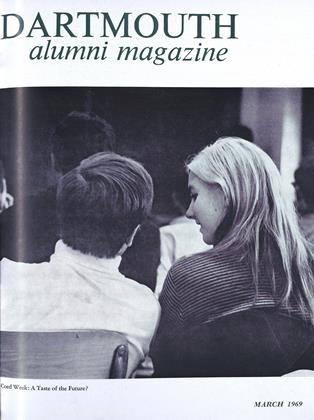By Henry W. Ehmann.Boston: Little, Brown and Company, 1968. 368 pp. Paperback. $3.95.
Half a dozen years ago Professor Ehrmann gave a talk on de Gaulle before the Dartmouth French Club; I was impressed by his flawless French, the accuracy and depth of his expose. Today, as I finis" studying his Politics in France, in flawless Hnglish, I am even more impressed. It is an introductory, comparative scrutiny of the French political system since it was centralized under Louis XIV; it emphasizes the period beginning with the 1789 Revolution, and more so the last ten years under de Gaulle. It explains clearly the major differences between the theory and practice of government in France on the one hand, and in the United States, Great Britain, and the two Germanys on the other.
Eleven chapters delve into the history of French politics, the economic and social setting, political socialization and participation, the recruitment and style of decision makers, the interest groups, political parties, etc.; there is a striking 23-page postscript on the near revolution of May-June 1968.
On the whole I am in agreement with the author who not only has backed his analyses with those of the best political writers, but has shown originality, insight, and sympathie. The only shock that I received was when I came across the phrase "the senseless specialized agregation," p. 67; one more of my illusions perdues! Also, when Professor Ehrmann inquires why democracy works more painfully in France than in the United States and Great Britain, and then pitches at the French congenital distrust of the central government, skepticism, indiscipline, selfishness, tax evasion, a proclivity to excitement over turbulence, crises and violence, I am tempted to pick up the ball, throw it back into any nation's backyard, and call it human nature. Shall we ever learn? We should, with the help of such books as Professor Ehrmann's.
Mr. Denoeu is Professor of French, Emeritus, Dartmouth College.
 View Full Issue
View Full Issue
More From This Issue
-
 Feature
FeatureJames Marsh, Dartmouth, and American Transcendentalism
March 1969 By Douglas M. Greenwood '66 -
 Feature
FeatureFaculty Votes Reduced Status for ROTC
March 1969 -
 Feature
FeatureReaching Out from Hanover
March 1969 By Ron Talley '69 -
 Feature
FeatureCOED WEEK: A Taste of the Future?
March 1969 -
 Article
ArticleThe Undergraduate Chair
March 1969 By CHRIS KERN '69 -
 Class Notes
Class Notes1958
March 1969 By WALTER S. YUSEN, WILLIAM C. VAN LAW JR.
FRANCOIS DENOEU
Books
-
 Books
BooksNORTHERN LIGHTS: WRITERS FROM THE UPPER VALLEY OF VERMONT AND NEW HAMPSHIRE.
June 1974 By CLAUDE G. LIMAN '65 -
 Books
BooksThe Biology of Death
June, 1923 By H. G. Coar -
 Books
BooksTHE COST BOOKS OF TICKNOR AND FIELDS AND THEIR PREDECESSORS
January 1950 By Harold G. Rugg '06 -
 Books
BooksInfested With Sharks
June 1980 By Joseph W. Bishop Jr. ’36 -
 Books
BooksMan in the Cambric Mask
JUNE 1982 By R. H. R. -
 Books
BooksMR. BRIDGE
JULY 1969 By ROBERT O. WHITE '54






